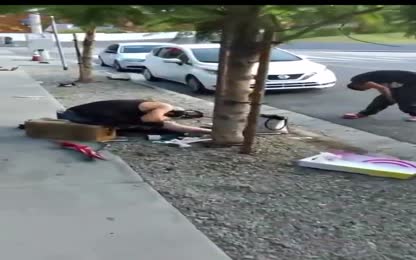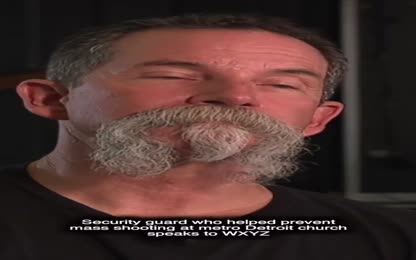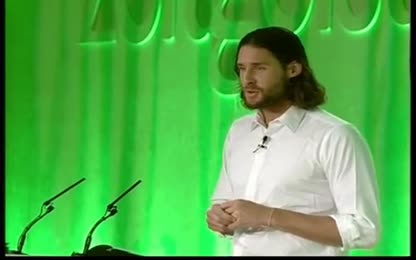Advertisement
Full Length - The Security Junkie Syndrome; How Pausing the World Leads to Catastrophe
David Eberhard is challenging the gospel truth that lockdowns saved millions of lives.
TEDx Talks (Full Length Video) - By David Eberhard
The Security Junkie Syndrome; How Pausing the World Leads to Catastrophe | David Eberhard | TEDxSSE
https://www.youtube.com/watch?v=43J7hD9I0jY
Why are we obsessed with danger, and conversely with safety? The Swedish psychiatrist and author David Eberhard comments on the effects that a lockdown has on a population, and on how we feel less and less secure despite arguably living in the safest period of time in human history. David has worked in psychiatry for most of his adult life, at multiple different centers in Stockholm. Since 2019, David is working as the head of staff at PRIMA Maria Addiction Care Clinic.
- Category: Blue Pills Swallower,Nanny State,Sheeple/Gullible People/Zombie,Throwing in the towel
- Duration: 17:09
- Date: 2021-05-15 06:11:42
- Tags: no-tag
0 Comments
Video Transcript:
Hi, my name is David Abouhart. I am a psychiatrist and I work as a senior consultant and I am the head of staff at Prima Maria Addiction Care Clinic in Stockholm. I have been working with psychiatry since 1986 and for the last 13 years I was based at Stockholm County Psychiatric Emergency Board. The last five years of that as head of staff. To summarize it you could say that I have spent my entire adult life in a psychiatric emergency room and if you do that you will meet people who have been traumatized beyond comprehension. You will meet people who have lost all the children who have been raped, assaulted, tortured. If you work with psychiatric emergency care you have seen everything or almost everything. We tend to think that life events we have been through is the course for a lot of our later problems but this is only partially true. If you work in a psychiatric emergency ward you will find that a lot of people are seeking help for trivial traumas such as feelings of envy towards their brother or sister that may have gotten ice or Christmas gifts in their childhood and they may very well feel much worse than the tortured guy in the next room. This is when you come to think of it not strange at all because the reasons why we become the persons we are are complex. It has to do with both genetics and environmental factors and most of the environmental factors have nothing whatsoever to do with nurturing and parenting or external traumas. Most of them are purely coincidental but how we manage our lives and how we react to hazards and obstacles in life has to do with our expectations on life and these expectations are affected of the culture we live in. For the last four or five decades it has been exceptionally safe to live in the Western world. You don't even have to go back a hundred years in time to understand that people throughout history had a really hard time. They lived short, unsafe and unfair lives. Their whole existence were a consequence of the grim rationale leading to the survival of the fittest. They fought a grotesque, meaningless struggle against nature. Historically the best evolutionary strategy of our ancestors have always been to try to stay as safe as possible and seek as much security as possible. In 2006 I wrote the book in the Land of the Security Junkeys. I had in my clinical work noticed that the generations starting with the millennials in many ways had lost touch with nature which led them to seek psychiatric help for things that previous generations thought were natural parts of life. I also found that this behavior to a large extent could explain how the society in itself reacted. You could see it in how institutions were functioning and in legislation. Even though the society had become safer and safer, everybody everywhere still tried to protect themselves against everything. Even things that no previous generation would have considered harmful. If you live in a place that is secure enough you will have time enough to consider the fact that everything is potentially dangerous. In such a world it will not matter that objectively the world has never been safer and that life expectancy rate is getting closer and closer to 100. Regardless of how we live our lives, you can never be too careful. The more safety you get, the more safety you seek. If you live in an artificial environment everything you read about, everything you hear about may harm you. The list of things that are potentially dangerous is infinitive because life itself is dangerous. This is an effect of people no longer being a part of nature. We all know that the mortality rate is 100%. The measures we try to take in order to prevent anything to happen can never be too many. We have to ask ourselves in an oversecure society what would be the perfect way to die. I have been thinking a lot about that and I think I have the solution to the question. In the oversecure society the perfect way to die would be that you are 95 years of age, your children have become so old that they have caught dementia and forgotten all about you and then you've withered away in the home for the elderly because there is no other acceptable way to die. Everything else would be to die in vain. There are two different reasons for us being too risk-avert in the modern western world. One is the precautionary principle which tells us that everything that is an absolutely 100% safe is best treated as being dangerous. But there are problems with this strategy at least if you carry it too far. The precautionary principle in it in it in its extreme leads to stagnation. The precautionary principle may lead to new unexpected dangers and it is extremely expensive which in itself also may lead to the first two effects. The other reason for us being risk-avert is that we react to events instead of reacting to rational risk factors. In risk analysis you see that people tend to overreact on two kinds of risk factors. We overestimate the risk if the expected outcome, if happening, will lead to a certain death and we overestimate the risk if we cannot control the situation. Typically we overestimate the risk of being part of a plane crash. If the plane will crash you will probably die and since you normally don't fly the plane you have no control over the situation. But it's more than thousand times more dangerous to take the car to the airport and that's pretty safe too. I come from the global leading country in the world when it comes to the precautionary principle Sweden. What happened 2020? Sweden was initially acting with a laissez-faire approach to Covid while the rest of the world was competing in totalitarian lockdown strategies leading to a global pause that we haven't seen before in history and absolutely haven't seen the full effects of yet. It has been as if the whole world has caught a full-scale epidemic global panic disorder and one year after all the rest of the world also Sweden became infected with fear. The cool initial response unfortunately seemed to have nothing to do with a more evidence-based approach. Instead it seemed to be a way to making a necessity of the fact that it would have been impossible to have a lockdown since no part of the municipality had been preparing for any catastrophe for decades. This in fact a symptom of an advanced form of what I call the security junkies syndrome. The reason for not taking action seemed to have more to do with lack of responsibility and less to do with rational thinking. The government could not even think that anything really harmful could happen so they did nothing, a form of security paradox. So you could argue that the rest of the world were acting totally logic and only Sweden did everything wrong. You can't accuse most countries of being passive. Isn't the normal reaction on a lethal threat to prepare yourself? If the society's threatened it would seem relevant to take quick action so it wasn't a global lockdown strategy relevant. Wasn't it necessary for the world to take a pause? I would say no. Since the pandemic started there have been several studies trying to estimate the mortality rate of COVID. According to the majority of them among others a report from WHO written by John Yonidis, Professor in epidemiology at Stanford University, the mortality rate of COVID is between 0.15 and 0.25%. For people under the age of 70 the mortality rate is between 0.03 to 0.04%. Compared to the Spanish flu which had a mortality rate of 2.5%, and the Spanish flu was affecting mostly children and young adults. The main age of people dying from COVID is 84 years and the life expectancy rate in Sweden is 82 years. So it isn't it is relevant to ask the question whether you die from COVID or with COVID. Especially since a huge proportion of the elderly that died suffered from several other life threatening conditions. Also lockdown strategies seems to have no or very small effect on case growth and no effect on death rates. The only factors besides age that have been shown to have significant effect on the number of deaths on a national level of BMI in the population and the countries GDP. The higher the more deaths this indicating that the relevant risk factors are obesity and age since high GDP probably is correlated to both. Instead of using excess mortality which is the only relevant measure media for over a year have been reporting cases of death. Maybe not so strange that people start to think that if they get the disease they will most certainly die. But people die all the time. It has to do with the fact that humans are mortal. But normally we don't see it on primetime television on a daily basis. The feeling in the population will be that everything is out of control which will lead them to overestimate the risks. They see the plane crash coming and act accordingly. If you provide numbers of deaths each day it will create panic and this is exactly what has happened. The whole world reacted to events instead of doing a relevant risk analysis. Governance all over the world issued total lockdowns and curfews. The world took an involuntary pause and the longer the pandemic have lasted the more draconic measures governments have been taking. And in a bizarre competition where they have been trying to show strength they have imposed more and more totalitarian legislation. Actions that have made them look alert and powerful. Considering the data it's tempting to attribute a lot of the actions taken by different governments to the Dunning Kruger effect. The Dunning Kruger effect is a cognitive bias explaining how ignorant people overestimate their own competence and therefore make huge mistakes. But I would argue that this can't be the only explanation since a lot of very well-educated people also epidemiologists that obviously knows a lot about epidemiology have been contributing to the panic. Instead the phenomenon makes me think of the essay the basic laws of stupid people from 1976 written by the Italian economic historian Carlo Cipola. In this little pearl Cipola describes five laws about stupid people that explains a lot of the problems of society. He begins to state that the amount of stupid people are not correlated either to education level or intelligence as defined by I.2. He finds stupid people everywhere even among noble price laureates. What defines stupid people is that their actions lead to bad outcome as well for themselves as for other people. And over-estimating the dangers of an infection with a mortality rate of around 0.2% and at the same time ignoring the massive negative effects of their actions cannot be described in a better way. We have seen a whole generation of children not going to school for over a year. We have seen massive negative economic effects on businesses with the following of unemployment and bankruptcies. And we haven't even started to see the full extent of the mental side effects that this has on the population. In the book in the land of the security junkies I defined a syndrome I called the National Panic Syndrome. In order for a country to suffer from the condition it needs to have symptoms of panic and avoidance behavior. The more symptoms the more severely affected it is. The syndrome is caused by and in a vicious circle also leads to people being too scared to die. At the same time it makes the population less ready and capable of handling real danger. People living in countries suffering from the National Panic Syndrome can easily develop the security junkies syndrome. The security junkies syndrome is characterized by you seeking more and more safety since you feel more and more insecure. Even though you live under the safest circumstances in history. And the safety gets the more things seem frightening since the real dangers are well taken care of. For every real danger you get rid of that will be at least 10 nearly dangerous things that will be upgraded to become real dangers. So the effect is that there will be more and more things to be afraid of. Therefore you will get afraid. And probably you also will become lazy. And most certainly you will act like a coward. But most importantly if you are afraid you will be very easy to control. Which is what we have seen during the pandemic. The National Panic Syndrome has developed into a global self-harming behavior. But remember it's all in your head. In order for society to get well we all need to stop acting risk-averse and instead in a rational way start to challenge our fears. Remember that life expectancy rate in the Western world is far over 80 years. The probability that you die of an infection that has a mortality rate of around 0.2% is neglectable. At least if you don't belong to any risk group. If not if you don't do that the risk is even lower. And whatever you do. Remember that life is not about living the longest but the best. If you live in fear and isolation there is no point in living. Don't lock yourself in and don't let others do it to you. Try to live a good life the relatively short time you have because as a wise man once said life is hard then you die. Don't make it harder.










 Donate
Donate







